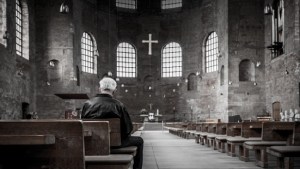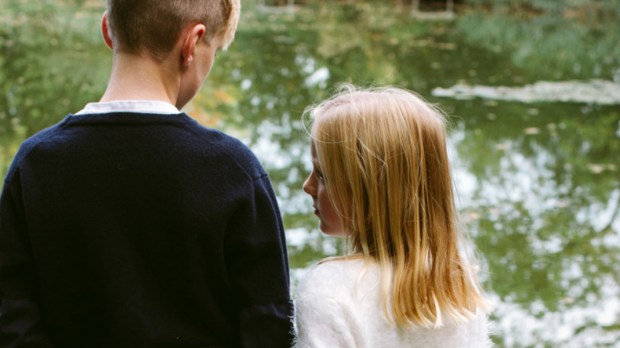Lenten Campaign 2025
This content is free of charge, as are all our articles.
Support us with a donation that is tax-deductible and enable us to continue to reach millions of readers.
It wasn’t a huge surprise to hear that my brother had died at the age of 38. He was an alcoholic and had probably been so for about 20 years. A lot happened to us as a family in that time, and Jim’s illness was never far from any of our minds. There were arguments and disagreements over how best to help him. There were numerous hospital stays, and the ever-present worry that when my phone rang, it would be the worst possible news. My brother was an amazing man: he was kind, funny, and very clever. His life and death have challenged me to examine my own life, and my faith.
I began grieving the loss of my brother long ago. Even though he died over a year ago, I have missed him for many years. Much of what he said and did in the last years of his life wasn’t him; his actions weren’t those of the brother I remember and love from my childhood. Reconciling his loss with all my memories of him is thus a very hard thing to do. He was my big brother, and it always seemed there was nothing he couldn’t do.
Now that he’s gone, I find myself wondering how to be now: how to be as kind and funny and clever as he was, to try to fill the gap he left for our parents; how to be the best mother I can be and to raise my children in such a way as to make their uncle proud; how to live through my grief and find the joy and celebration in what he gave us when he was still alive.
I also wonder how to be the best daughter I can be, given that I live four hours from my parents, and that he has left me alone to manage their grief as well as my own. I am surprised by the number of people who ask me how my parents are — and then don’t then ask how I am. Being a supportive daughter is clearly important, but I have not yet worked out what that looks like in the midst of my distress as a sister.

Read more:
How the words of a stranger eased my grief over my 12-year-old’s death
All of these thoughts lead me to questions of God’s plan for me, for my family, and what His plan was for Jim. In the days after his death, my parents’ parish priest spoke words that touched me deeply: he told us that we probably loved Jim now, in his death, more than we had ever loved him while he was alive. I think that’s true. Much of the pain and hurt that occurred during Jim’s life melted away in those first few days after his death, as we all desperately tried to recall the stories of his youth, of happier times — when he was funny and kooky and, well, just Jim.
The priest also hinted at what God’s plan for Jim could well have been: in his life, in his troubles and his illness, Jim forced his family and friends to love him in a deep, hard, and determined way. We had to dig down, right into the depths of our hearts, to love Jim and forgive him his actions and words. Isn’t that what God does for us, effortlessly, every single day of our lives? Without question, God forgives whatever we put in front of Him because of the depths of His love for us.
The last time I saw Jim, two weeks before he died, he was drunk. He had traveled the four hours to my home with my parents to meet his new niece, Madeleine, who was born recently. Jim had been very excited about this trip, and had been posting messages on Facebook about it for weeks beforehand. Shortly after they arrived, however, I realized that he had been drinking. I was so angry with him — why could he not have stayed sober for that short space of time, for just one day, while he met Madeleine for the first time and spent time with his other two nieces? In the end, he spent only about 30 minutes with them before my parents took him back to the hotel. That was the last time my daughters saw their uncle.
The last phone conversation I had with him, however, took place a few days after his visit, and it was very different. He apologized profusely, and I do believe that he meant what he said. He knew how disappointed the children had been not to have seen him properly, and he knew that he had let me down. He promised that he was looking into treatment options and had been planning to revisit his doctor for help in beating his addiction. His body had other ideas, however — it simply couldn’t cope with the abuse it had already suffered over the many previous years. How can one be angry with someone who was clearly so desperately ill? This was someone who didn’t try to spoil his visit; he simply couldn’t help himself.
God’s plan for me, then, is surely to continue this journey of love and to somehow let go of the anger of the past. Through the trauma and heartache of the last few years, my heart has been trained well, and I need to continue to plough the depths of my heart and soul to reach out to others. Perhaps I need to examine how I can help those who most desperately need love but who don’t receive it as often as they need it — addicts, certainly, or the homeless — those who live on the fringes of society.
Jesus wept with Martha and Mary over the death of Lazarus, and as he did he displayed compassion, humanity and sympathy for the grieving sisters. Although He knew He was going to raise Lazarus to new life, He clearly understood the immediacy of the sisters’ sadness. Grief is inevitable, and although we have faith that our departed brothers and sisters will be raised to new life in heaven, it is a process that we left here on earth must go through.
I miss my brother; I always will. I give thanks that he no longer suffers in pain and sadness, and I pray that he is now enjoying the peace that he could not find when he was alive.
1. If you believe you may have a problem with alcohol, please consider attending an Alcoholics Anonymous meeting or visit their Facebook page here.
2. For more information about alcoholism and how it affects families, click here.
3. Al-Anon offers in-person meetings, similar to AA, for family members of people struggling with alcohol addiction. Visit their Facebook page here.
4. The Grief Toolbox is an online resource for the bereaved. The site shares stories, articles and artwork intended to help people navigate loss. Visit their Facebook page here.
5. Good Therapy helps people find therapists and provides information on recovering from grief. Visit their Facebook page here.
6. Grief Haven provides support for parents who have lost a child. Visit their Facebook page here.

Read more:
Something more powerful than Xanax helped me with my grief

